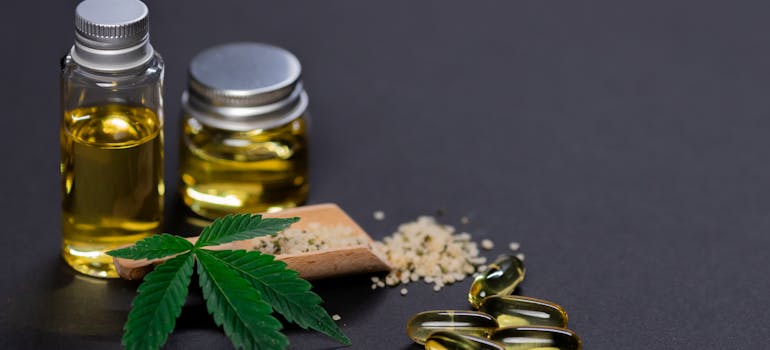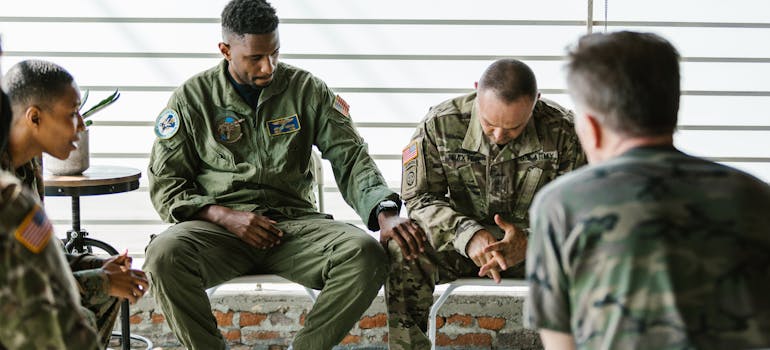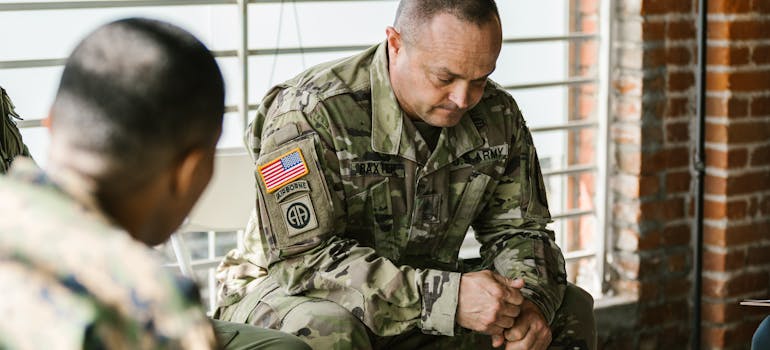Many veterans face a tough road when they return home, and for some, this includes battling substance abuse. At Harmony Ridge Recovery Center, we recognize the unique challenges that contribute to the use of commonly abused drugs by veterans. Whether it’s coping with physical pain from service-related injuries or dealing with the mental strain of post-traumatic stress, the journey toward recovery is often steep. Our aim here is not just to inform but to offer support and understanding. We’ll explore the reasons behind substance abuse and discuss effective ways to help veterans regain control over their lives. Seeking help is a sign of strength, and recovery is a path that no one should walk alone.
Statistics on Substance Abuse Among Veterans
Facing the facts can be tough, but it’s necessary. Among veterans visiting VA facilities for the first time, 11% are diagnosed with a substance use disorder. A striking 80% of these veterans struggle with alcohol abuse, while 27% battle illegal drug use. Prescription drug misuse isn’t far behind, affecting about 10% of veterans, primarily due to chronic pain and mental health challenges.

Also, older veterans (aged 65 and older) are less likely to misuse substances compared to younger veterans. Female veterans are more likely to misuse prescription drugs, while male veterans have higher rates of alcohol and illicit drug use.
If you or a veteran you know is dealing with these challenges, reaching out for help is a brave step towards reclaiming control. There are dedicated professionals and resources ready to support you through this. You’re not alone, and there is a way forward.
What Are the Most Commonly Abused Drugs by Veterans?
Veterans often face immense challenges that can lead to struggles with substance abuse. The pressures of transitioning from military to civilian life, coupled with the physical and emotional scars of service, sometimes push veterans toward substance use as a coping mechanism. Here are the commonly abused drugs by veterans that we’ll explore:
- Alcohol
- Prescription Painkillers (Opioids)
- Benzodiazepines
- Stimulants
- Cannabis
Alcohol Use in the Veteran Population
Alcohol is the most commonly abused drug by veterans, deeply linked to the military culture and the tough shift back to civilian life. Imagine, more than a third of active-duty service members binge drink. The trauma from combat only intensifies this issue. When service ends, the challenge doesn’t fade away; over 65% of veterans in addiction treatment point to alcohol as their primary problem.
Among younger veterans, aged 18 to 25, nearly two-thirds report using alcohol monthly, and about 10% drink heavily. These alcohol addiction figures are alarmingly higher compared to their non-veteran peers. Clearly, there’s a pressing need for dedicated support to help veterans navigate these turbulent waters.

Health Impacts of Alcohol Misuse
The shift from casual alcohol use to addiction can be gradual and dangerous, especially for veterans. If you or a veteran you know is struggling, seeking help can pave the way to a healthier future. Here’s how it impacts their health:
- Mental health: Alcohol addiction can worsen symptoms of PTSD, anxiety, and depression, trapping veterans in a cycle of emotional turmoil.
- Physical health: Long-term abuse leads to liver damage, heart disease, and increased risk of accidents.
- Social effects: Relationships suffer as behaviors change and dependence grows, isolating veterans from the support they need.
- Professional life: Job performance can decline, risking careers and financial stability.
Veterans and Opioid Addiction
Injuries from military service often result in opioid prescriptions, setting a path toward potential misuse among veterans. It’s a troubling trend: from 2015 to 2018, the number of veterans diagnosed with opioid use disorder in the Veterans Health Administration jumped from nearly 64,000 to about 71,000. Specifically, Hydrocodone and Oxycodone are the top culprits, with misuse reported by approximately 224,000 and 232,000 veterans, respectively.
This high prevalence of opioid abuse highlights a critical need for effective drug rehab for veterans, focusing on both the physical injuries and the psychological impacts of service. Addressing this issue is essential in reducing the dependency that places opioids among the most commonly abused drugs by veterans. Access to comprehensive treatment can help veterans reclaim control over their health and their lives.
The Dangers of Opioid Misuse
Opioid addiction carries serious risks that can impact every aspect of a veteran’s life. Here’s what to watch out for:
- Addiction: Opioids are highly addictive, leading to physical dependence quickly.
- Overdose: High doses can suppress breathing, leading to fatal overdoses.
- Side effects: Long-term use can result in constipation, sleep disturbances, and increased pain sensitivity.
Benzodiazepine Use Among Veterans
Benzodiazepines are often prescribed to veterans to manage anxiety, insomnia, and even symptoms of PTSD. However, trends show a shift in prescribing practices. From 2012 to 2020, prescriptions for VA PTSD patients notably dropped from 30% to just 9.1%, reflecting a cautious approach to their use due to potential misuse.
Despite the reduced prescribing rates for older veterans—from a study spanning 2013 to 2017—the path to misuse remains a concern. Those who are re-prescribed benzodiazepines often share specific demographic and clinical traits, pointing to a pattern that needs careful management. Moreover, the combination of benzodiazepines with opioids increases risks significantly. Recent data indicates a heightened risk of emergency visits and fatal overdoses among patients with such co-prescriptions. For those struggling with dependency, benzo rehab programs offer targeted support to safely manage withdrawal and recovery.
Risks of Benzodiazepine Dependence
Benzodiazepine dependence is a real and challenging issue for many veterans, stemming from prolonged use. Here’s what you need to know about the risks:
- Dependence: Over time, the body can become reliant on benzodiazepines to function normally, leading to increased dosages and a difficult withdrawal process.
- Cognitive decline: Long-term use can impact cognitive functions, affecting memory and decision-making.
- Physical health risks: Extended use increases the risk of falls, accidents, and impaired motor skills.
- Withdrawal dangers: Suddenly stopping the medication can lead to severe withdrawal symptoms, including seizures, anxiety, and insomnia.
Stimulant Use and Abuse by Veterans
Stimulants are often prescribed to veterans to treat conditions like ADHD or narcolepsy, helping to enhance focus and alertness. Unfortunately, the line between use and misuse can blur. Recent trends show a slight increase in the misuse of prescription stimulants, as well as illicit stimulants like methamphetamine and cocaine among veterans. While the misuse of substances like LSD has decreased among younger veterans and stabilized in older groups, the overall concern remains.
Misuse often starts as an attempt to manage stress or boost mental clarity but can quickly lead to dependency. It’s crucial for veterans and their support networks to be aware of these risks and to seek help early if misuse is suspected. Supportive resources and treatment programs are essential in preventing misuse and assisting recovery.
Health Risks of Stimulant Misuse
Misusing stimulants can lead to serious health and life complications. Here are some of the effects veterans might face:
- Mental health: Anxiety, paranoia, and mood swings can intensify with stimulant misuse.
- Physical health: Increased heart rate and high blood pressure, risking heart attacks and strokes.
- Addiction: The potential for developing a dependency that can dominate daily life.
- Social impact: Relationships and social interactions can deteriorate, leading to isolation.
Cannabis Use by Veterans
Cannabis use among veterans is gaining wider acceptance for both therapeutic and recreational reasons. In 2019, nearly 10% of U.S. veterans reported using cannabis in the past year. This number increased in 2020, with about 12% of veterans overall and over 20% of those aged 18 to 44 using cannabis in the past six months. Many veterans turn to cannabis to manage symptoms of PTSD and other service-related health issues, finding relief not always available through conventional medications.
This shift reflects changing attitudes towards cannabis, which is now viewed by many as a viable option in the array of commonly abused drugs by veterans. As the conversation around cannabis use continues to evolve, it’s important to balance understanding its benefits with recognizing potential risks.

Effects of Cannabis Use on Veterans
The view on cannabis within the veteran community is shifting significantly. As awareness grows, so does the openness to using cannabis for both medical and recreational purposes. Here’s a quick look at the benefits and risks:
Benefits:
- Pain relief from chronic conditions.
- Reduction in PTSD symptoms.
- Improved sleep quality.
Risks:
- Potential dependency.
- Legal implications, depending on the state.
- Possible mental health impact, such as increased anxiety or paranoia with high use.
The PTSD Link to Substance Abuse in Veterans
PTSD is an unfortunate reality for many veterans, with 7% experiencing it at some point in their lives. In any given year, between 11% and 20% of veterans are living with PTSD. This translates to about 209,000 to 380,000 of the 1.9 million veterans grappling with this condition annually. The stress and trauma associated with PTSD often lead veterans to turn to substances as a form of self-medication.
They might use alcohol, prescription drugs, or illegal substances to mute the painful memories and constant stress, but this can quickly spiral into misuse or addiction. Recognizing the connection between PTSD and substance abuse is crucial for providing effective support and intervention strategies to help veterans reclaim control over their lives and health.

Addressing Dual Diagnoses in Veterans
It’s not uncommon for veterans to face both mental health issues and substance abuse simultaneously, known as co-occurring disorders. Addressing these challenges separately often falls short, highlighting the importance of integrated treatment. In West Virginia, dual diagnosis programs are specifically designed to manage these intertwined issues together.
This comprehensive approach is essential because it treats the entire scope of a veteran’s struggles, leading to better recovery outcomes. For veterans struggling with combinations like PTSD and addiction or depression and alcohol abuse, accessing dual diagnosis treatment West Virginia residents speak highly of can be a crucial step towards healing.
Overcoming Treatment Barriers for Veterans
Veterans often encounter significant barriers when seeking treatment for substance abuse. Stigma remains a major hurdle, with many fearing judgment for their struggles. Additionally, logistical issues, such as long travel distances to treatment facilities or unclear paths to care, complicate access. Recognizing these obstacles, efforts are underway to enhance the levels of care available to veterans.
This includes expanding local treatment centers, improving transportation options, and increasing telehealth services to reach veterans in remote areas. There’s also a push to educate healthcare providers and the public about the unique challenges veterans face, which aims to reduce stigma and make seeking help less daunting.
Where Veterans Can Turn for Help
It’s crucial for our veterans to know they’re not alone in their struggles. Whether it’s dealing with substance abuse or navigating the emotional toll of post-service life, help is available. Reaching out is a sign of strength, and the first step towards a healthier future.

VA Healthcare Programs
Veterans can access a variety of treatment programs through the Veterans Health Administration, which include detoxification, rehabilitation, and therapy services designed specifically for veterans. These programs are staffed by professionals who understand the unique needs of veterans and can provide tailored care.
Counseling Services
Counseling is a vital tool for veterans struggling with substance abuse. Many community centers and private therapists offer specialized counseling for veterans, addressing issues like PTSD, addiction, and reintegration into civilian life with motivational interviewing. These services help veterans cope with emotional and psychological challenges in a supportive environment.
Peer Support Groups
Joining a peer support group therapy can be immensely beneficial. Groups such as Veterans Affairs-sponsored support meetings or non-profit organizations offer a space where veterans can share their experiences and challenges with peers who understand their journey. These groups promote healing through shared stories and mutual support.

A Path to Recovery for Veterans
As we’ve explored the commonly abused drugs by veterans, it’s clear that the battle doesn’t end when service does. Substance abuse can be a silent struggle, but it’s one that doesn’t have to be faced alone. Effective support and real solutions exist, and they can make a profound difference. If you or a veteran you know is fighting against substance misuse, remember that taking the first step towards help is a brave and necessary move towards recovery. Let’s keep the conversation going. Reach out, seek help, and take back control.



